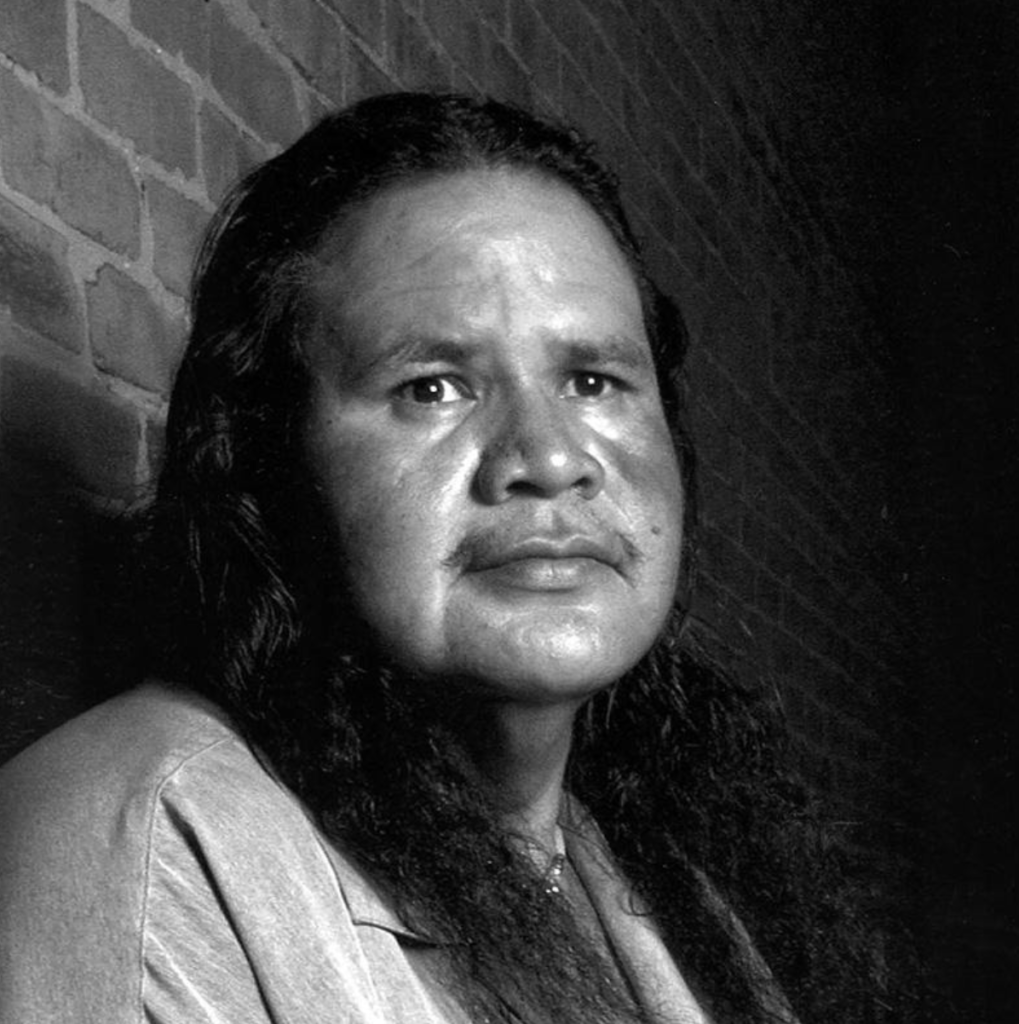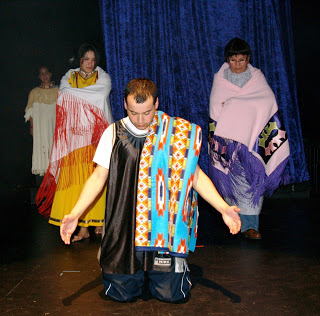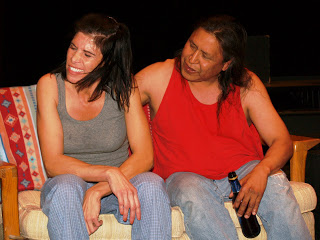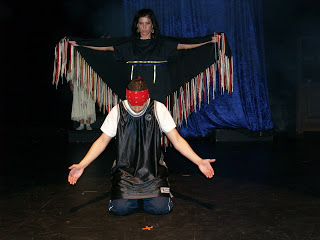
Biography
William S. Yellow Robe, Jr. (1962-2021) was an Assiniboine and African American playwright, director, actor, and writer. He was a registered member of the Assiniboine and Sioux of Fort Peck Indian Reservation in Montana, where he spent his childhood. He studied creative writing and performing arts at the University of Montana.
Yellow Robe wrote over 45 plays, including the Independence of Eddie Rose, The Star Quilter, Making Indixns, Grandchildren of the Buffalo Soldiers, and Wood Bones. His plays have been produced in numerous festival and educational institutions around the United States, including The New Jersey Repertory Theatre Company, No Borders Indigenous Inter-Tribal Theater Company, New World Theater, Company, Wakiknabe Theater Company, and No Borders Indigenous Inter-Tribal Theater.
Yellow Robe was the recipient of several honors and fellowships; he is the first playwright to receive a Princess Grace Foundation Theater Fellowship and the first Native American playwright to receive a Jerome Fellowship from the Minneapolis Playwrights’ Center. He is also a recipient of The First Nations Book Award for Drama and a New England Theater Foundation Award for Excellence.
Career Highlight
In 2016, William S. Yellow Robe, Jr.’s play Sneaky was performed at the New Native Theatre’s Summer Play Tour in Saint Paul, Minnesota.
The Independence of Eddie Rose (1986)
- Genre: Drama
- Breakdown:
- 4F Native American, 3F Native American
- Synopsis:
- The Independence of Eddie Rose tells the story of a young man, Eddie Rose, and his struggle to get out of an unhealthy household environment plagued by alcoholism and verbal, physical, and sexual violence. Eddie and his younger sister Theia scramble for legal independence from their mother Katherine, whose own demons, vices, and addictions make the home an uncertain and unsafe place. The Independence of Eddie Rose uses it’s blend of realism and symbolism to ask the question, what will it take for you home to no longer be home? through this specific imagining of a Native American household in the US.
- Development/Production History:
- Written in 1986
- Productions:
- 1986: Production at University of Montana’s Masquers Playwrighting Festival in Missoula, Montana, directed by Rolland Meinholtz
- 1987: Production at Seattle Group Theatre’s “Third Annual Multi-Cultural Playwright Festival” in Seattle, Washington, directed by Susan Finachell
- 1989: Staged Reading at Ensemble Studio Theatre’s “New Voices” Reading Series in New York, New York, directed by Jack Gelber
- 1990: Production at Seattle Group Theatre’s “Goodwill Arts Festival” in Seattle, Washington, directed by Tim Bond
- 1998: Production at Yale University’s Theater Studies Department in New Haven, Connecticut, directed by David Krasner
- Weblink to purchase play from publisher:
- Photos from a 2010 production at the Rose Theater in Omaha, Nebraska:



The Star Quilter (1987)
- Genre: Drama
- Breakdown:
- 1F Native American, 1F Non-Native/White
- Synopsis:
- Mona Gray, an Assiniboine Montanan mother and wife, is approached in the 1960’s by LuAnne Jorgensen, a second-generation Montana farmer with a coercive request to buy one of Mona’s handmade traditional star quilts as a gift to the senator. Reluctantly, Mona agrees, and what follows is an exploitative economic relationship at Mona’s expense. Spanning across four decades to track the evolution of the pair’s “friendship” alongside the changing local and national political climates, The Star Quilter tells the story of how Mona Gray learns the politics of defending the integrity of her work and her culture.
- Development/Production History:
- Written in 1987
- Productions:
- 1987: Staged Reading at the Crystal Theatre in Missoula, Montana, directed by William S. Yellow Robe, Jr.
- 1996: Radio Broadcast by British Broadcasting Corporation in their Radio Drama series
- Staged Reading at The New Jersey Repertory Theatre Company (NJRep) in Long Branch, New Jersey, directed by William S. Yellow Robe, Jr.
- 2000: Print Publication in Anthology Where the Pavement Ends: Five Native American Plays by William S. Yellow Robe, Jr.
- Weblink to purchase play from publisher:
- There are unfortunately no production photos yet available for The Star Quilter.
- Plays
- “Native American Paranormal Society” (Reading), Minsky Hall, University of Maine, Orono, – ME-March 2007
- “Pieces of Us: How the Lost Find Home” (Reading) Trinity Repertory Company, Providence, RI-December 2004
- “Falling Distance” (Reading) No Borders Indigenous Inter-Tribal Theater Company, AS220, Providence, RI-August 2003
- “A Stray Dog” (Reading) University of Maine, Orono, ME-April 2003
- “Better-n-Indins”< (Reading) No Borders Indigenous Inter-Tribal Theater Company (Western Band), Arlee, MT-February 2003
- “Grandchildren of the Buffalo Soldiers” (Reading) No Borders Indigenous Inter-Tribal Theater Company, Rites and Reasons, Brown University Providence, RI-November 2002
- “Rez. Politics” (Production) California State University-Theater Department, Northridge, California-April 2002
- “Blood of the Rez. Paper Wars” (Reading) Trinity Repertory Company, “Four Directions” playwriting series, Providence, RI-December 2001
- “New Forest Order” (Production) Theater Department, College of Dupage, Warrenville, Illinois-November 2001
- “How Tribal are you?” (Production) Theater Department, City College of San Francisco, California-March 2000
- “The Council” (Production) Wakiknabe Theater Company, National Museum of the American Indian, New York, New York-June 1999
- “The Star Quilter,” and “The Body Guards” (Reading) New Jersey Repertory Company, Long Branch, New Jersey-June 1999
- “A Broken Bottle-A Broken Family” (Production) Wakiknabe Theater Company, Mesa Elementary School, Shiprock, New Mexico-May 1999
- “The Council” (Production(s)) Emmy Gifford’s Children Theater, Omaha, Nebraska, April 1993 Honolulu Theater for Youth, Honolulu, Hawaii- January 1992 Seattle Children’s Theater, Seattle, Washington- February 1990
- “The Independence of Eddie Rose” (Production) Seattle Group Theater, Goodwill Arts Festival, Seattle, Washington-July 1990
- “The Pendleton Blanket” (Reading) The Mark Taper Forum, PlayLabs-90’s, Los Angeles, California-October 1990
- “Wink-da” (Production(s)) Ensemble Studio Theater, “Marathon of One Acts,” New York, New York-May 1989 American Conservatory Theater, “Plays in Progress” series, San Francisco, California- November 1988
- “Sneaky” (Production) New World Theater Company, University of Massachusetts, Amherst, Massachusetts-November 1987
- Bibliography
- Interview with William S. Yellow Robe Jr. (2007). https://hemisphericinstitute.org/en/hidvl/hidvl-int-native-theater/item/1354-ntfest-wsyellowrobe.html. Accessed 10 May 2021.
- NAAR | NATIVE AMERICAN ARTIST ROSTER. http://www.amerinda.org/naar/yellowrobe/playwright/playwright.htm. Accessed 10 May 2021.
- Update, Uno Nas. “UNO Native American Studies Update: The Independence of Eddie Rose.” UNO Native American Studies Update, 27 Apr. 2010, http://unonativestudies.blogspot.com/2010/04/independence-of-eddie-rose.html.
- Video: Interview with William S. Yellow Robe, Jr. [Video recording]. sites.dlib.nyu.edu, https://hdl.handle.net/2333.1/08kprrn0. Accessed 10 May 2021.
- “William Yellow Robe.” Playwrights’ Center, https://pwcenter.org/profile/william-yellow-robe. Accessed 10 May 2021.
- https://library.brown.edu/htmlfiles/1126055137923702.html. Accessed 18 May 2021.
- Web Resources
- Playwright Interview
- World Premiere play trailers or revival play trailer
- Playwright Website
- Playwright Wikipedia page:
- Playwright Production Website
- Playwright Award Webpage
Reflection on Contribution to Anti-Racist Theatre
William S. Yellow Robe, Jr.’s work’s contribution to creating Anti-Racist Theatre is two-fold. Primarily, it does so by featuring the traditionally underrepresented voices of Indigenous-Americans as main characters in his stories. Yellow Robe uses these voices and personages for more than tokenism or plot advancement; they each own her identities in all of their diversity. These casting decisions in Yellow Robe’s work chip away at the historically whitewashed quality of American theatre. Secondly, the messages in Yellow Robe’s works serve as examples of reparative mirroring. His plays display to readers/audiences the realities and consequences of cultural invasion, exploitation, incompetency, and appropriation. Readers/audiences can empathize with his Native protagonists and consequently be activated to empathize with those in society and/or the theatre world who are of similar identities and/or circumstances. Ultimately, William S. Yellow Robe, Jr.’s work calls for an anti-racist society where people can appreciate each other’s cultures and see others for more than their differences.
Compiled by Theresa Azemar, American Studies and English Major at the University of Notre Dame, Class of 2021